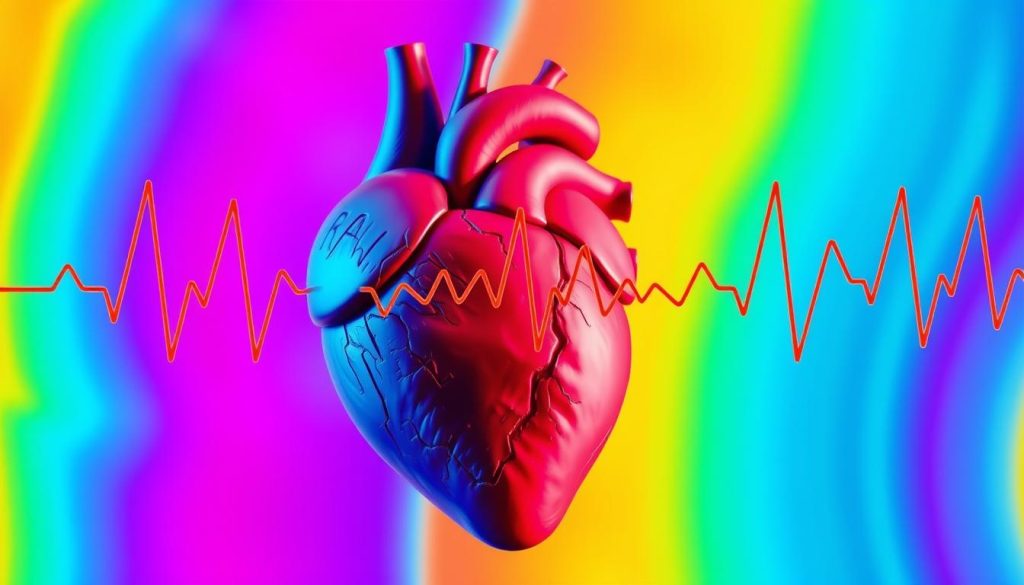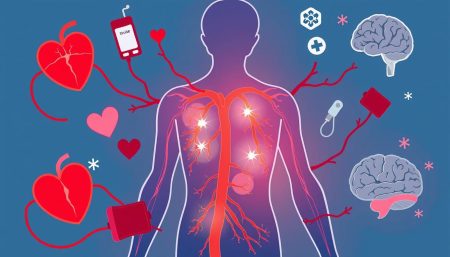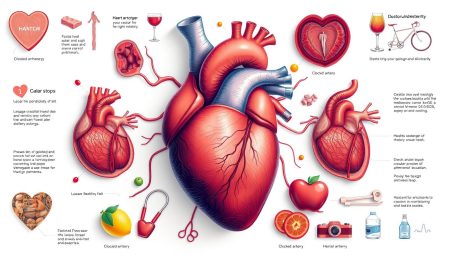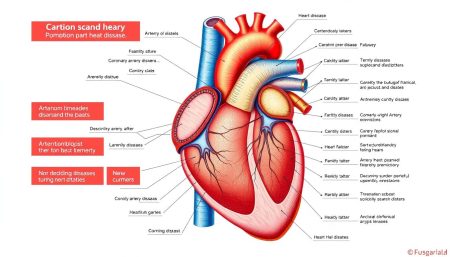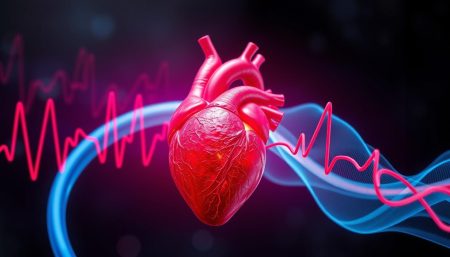Atrial fibrillation, or AFib, is a complex heart condition that affects millions in the U.S. This guide looks at AFib as a cardiovascular disease and its effects on heart health.
We’ll explore the symptoms, causes, and treatments for this irregular heartbeat. Whether you’re new to AFib or want to learn more, this guide offers key insights. It helps you understand this common heart issue better.
Understanding Atrial Fibrillation and Its Classification
Atrial fibrillation is a common heart problem that affects millions. It causes an irregular heartbeat, which can lead to serious health issues if not treated. Let’s dive into the details of this heart condition.
Definition and Basic Mechanism of AFib
Atrial fibrillation happens when the heart’s upper chambers beat chaotically. This is different from the lower chambers. This irregular rhythm can cause blood clots. The causes can vary, but often involve changes in the heart’s electrical system.
Types of Atrial Fibrillation
Doctors classify AFib based on how long and how often it happens:
- Paroxysmal: Episodes last less than 7 days
- Persistent: Lasts longer than 7 days
- Long-standing persistent: Continues for more than 12 months
- Permanent: When the heart rhythm can’t be restored
Impact on Heart Function
This irregular heartbeat can weaken the heart’s pumping ability. Over time, AFib may cause the heart muscles to weaken. This increases the risk of heart failure. Knowing this helps patients and doctors manage the condition better.
“Atrial fibrillation is like a domino effect in the heart. One small disruption can lead to a cascade of problems if not addressed promptly.”
Is Atrial Fibrillation a Cardiovascular Disease
Atrial fibrillation (AFib) is a cardiovascular disease. It messes with the heart’s electrical system, causing irregular and fast heartbeats. This makes it a type of heart rhythm disorder, or arrhythmia.
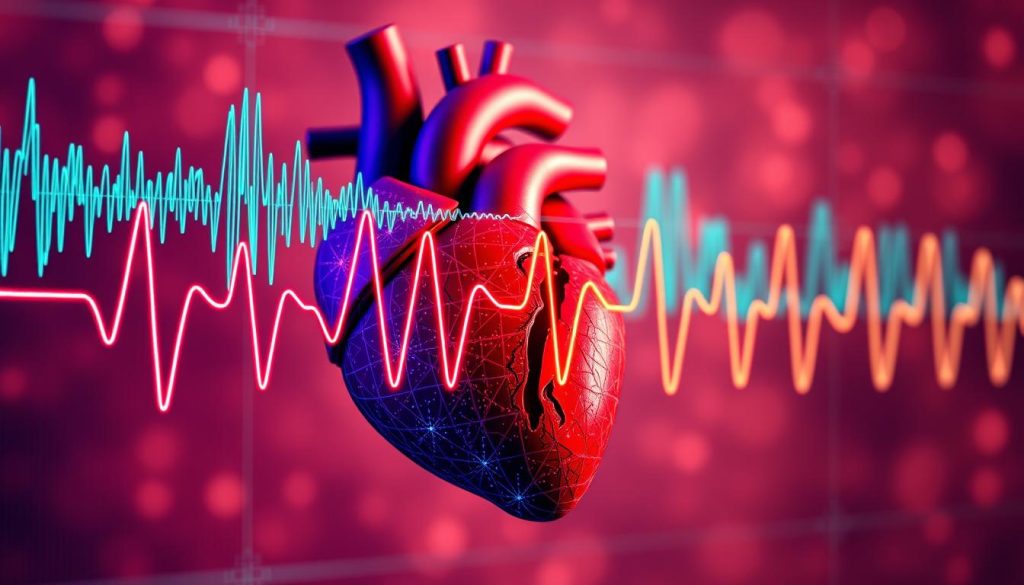
AFib is closely tied to other heart problems. People with heart disease are more likely to get AFib. And those with AFib are at risk for more heart issues.
The connection between AFib and heart conditions is complex. Some common links include:
- High blood pressure
- Coronary artery disease
- Heart valve problems
- Heart failure
Seeing AFib as a cardiovascular disease is key for managing it. Atrial fibrillation can lead to serious problems if not treated, like stroke and heart failure.
Doctors take a detailed approach to diagnose and treat AFib. They look at it as part of the bigger picture of heart health. This helps them understand its impact on the heart.
“Atrial fibrillation is not just an isolated electrical problem in the heart. It’s a complex condition that can both result from and contribute to other cardiovascular issues.”
By seeing AFib as a cardiovascular disease, doctors can tackle its wide effects on heart health. This helps them come up with better treatment plans for patients.
Common Symptoms and Warning Signs of AFib
It’s important to know the signs of atrial fibrillation to keep your heart healthy. This irregular heartbeat can change your life and health in big ways.
Physical Manifestations
AFib often makes your heart feel like it’s racing or fluttering. You might also feel chest pain, get short of breath, or feel very tired. Some people feel dizzy or off-balance, which can make it hard to move around.
Emergency Warning Signs
Some symptoms need you to get help right away. Look out for severe chest pain, fainting, or long-lasting heart palpitations. If you see these signs, get to the hospital fast to keep your heart safe.
Silent AFib and Its Risks
Not every case of atrial fibrillation shows obvious signs. Silent AFib can hide for years, causing big problems. It’s key to get regular heart checks to catch and treat it early.
| Symptom | Frequency | Severity |
|---|---|---|
| Irregular heartbeat | Common | Mild to severe |
| Shortness of breath | Frequent | Moderate |
| Fatigue | Very common | Mild to moderate |
| Chest discomfort | Occasional | Mild to severe |
Knowing about these symptoms and their risks is key to managing AFib well. By staying alert and informed, you can help keep your heart healthy and get help when you need it.
Risk Factors Leading to Atrial Fibrillation Development
Atrial fibrillation can be caused by many factors. It’s important to know what increases your risk. Age is a big factor, as the risk grows with age.
Genetics also play a role. If your family has a history of atrial fibrillation, you might be at higher risk. Conditions like high blood pressure, diabetes, and thyroid disorders can also increase your risk.
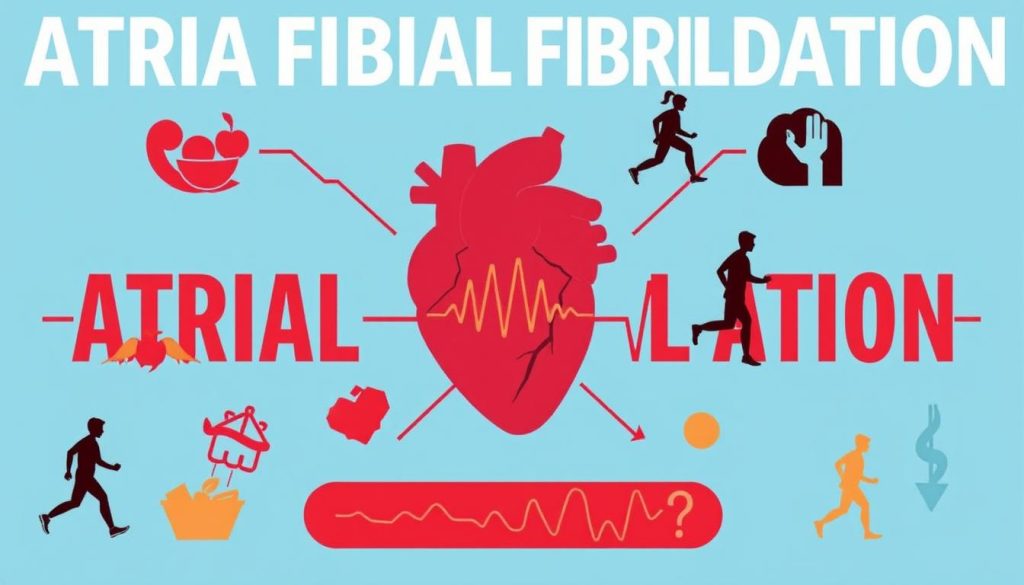
Your lifestyle choices can affect your heart health. Drinking too much alcohol, smoking, and not being active are all risks. Being overweight and having sleep apnea can also raise your risk.
| Risk Factor | Impact on AFib Risk |
|---|---|
| Age (65+) | High |
| Family History | Moderate to High |
| Hypertension | High |
| Obesity | Moderate |
| Alcohol Consumption | Moderate to High |
Knowing these risk factors is key to preventing atrial fibrillation. By changing what you can and watching your heart health, you can lower your risk. This is a proactive way to protect your heart.
Diagnostic Methods for Identifying Atrial Fibrillation
Identifying atrial fibrillation, a common heart arrhythmia, needs different tools. Doctors use many methods to spot and track this heart issue. Let’s look at the main ways to diagnose atrial fibrillation.
Initial Screening Tests
The first step is basic tests. These include:
- Electrocardiogram (ECG): A standard 12-lead ECG captures the heart’s electrical activity.
- Pulse check: Doctors may detect an irregular pulse during a physical exam.
- Blood tests: These help rule out other conditions that might mimic atrial fibrillation symptoms.
Advanced Diagnostic Procedures
When basic tests don’t show enough, more detailed procedures are used:
| Procedure | Description | Duration |
|---|---|---|
| Holter Monitor | Portable ECG device worn for continuous recording | 24-48 hours |
| Event Recorder | Patient-activated device for symptom-triggered recording | Up to 30 days |
| Echocardiogram | Ultrasound imaging of heart structure and function | 30-60 minutes |
Monitoring and Follow-up Testing
Keeping an eye on atrial fibrillation is key. This includes:
- Regular ECG checks
- Periodic Holter monitoring
- Implantable loop recorders for long-term heart rhythm tracking
Early detection and ongoing monitoring are essential for managing atrial fibrillation. If you notice irregular heartbeats or shortness of breath, see a doctor right away. Knowing the triggers of various health conditions helps keep you healthy.
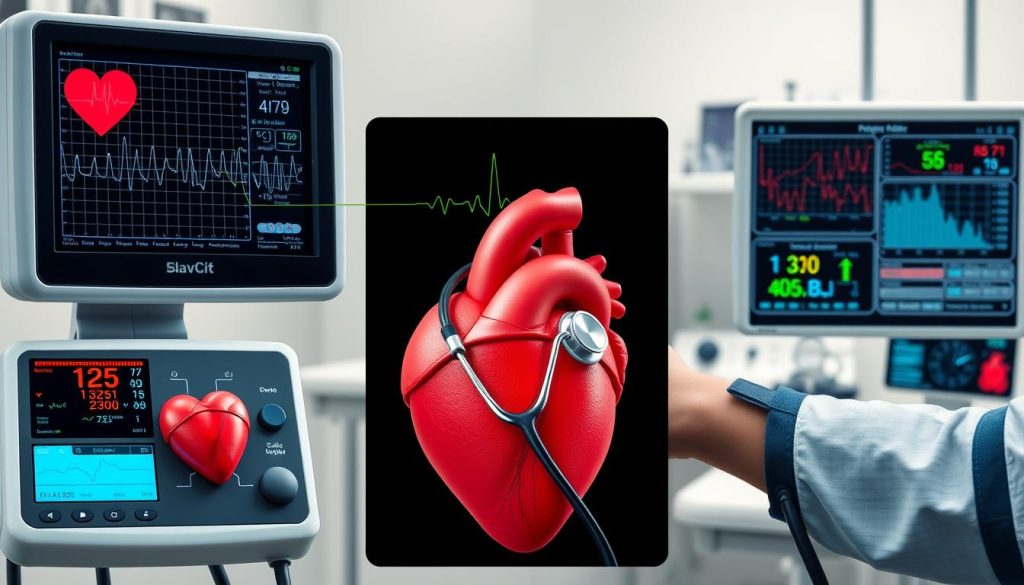
Treatment Options and Management Strategies
Atrial fibrillation treatment aims to improve heart health and reduce cardiovascular disease risks. Doctors tailor strategies to each patient’s needs, considering factors like symptom severity and overall health.
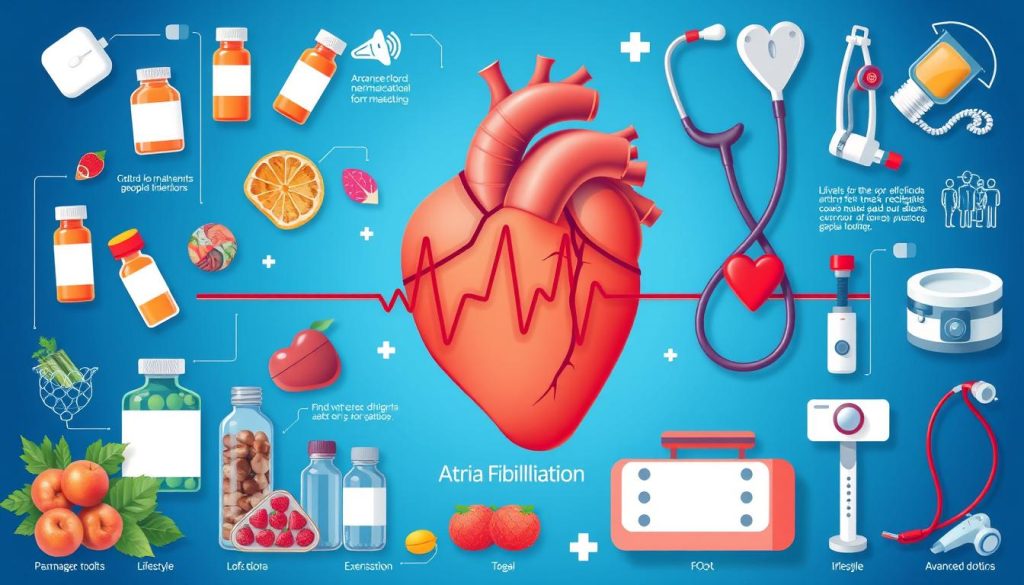
Medication is key in managing AFib. Anticoagulants reduce stroke risk, while rate control drugs slow rapid heart rates. Rhythm control medications help maintain a normal heartbeat. Some patients may need a combination of these drugs for optimal results.
Non-invasive procedures offer alternatives to medication. Cardioversion uses electrical shocks to reset the heart’s rhythm. Catheter ablation targets problem areas in the heart tissue, potentially eliminating irregular rhythms.
For severe cases, surgical options exist. The maze procedure creates scar tissue to block abnormal electrical signals. In some instances, a pacemaker implantation may be necessary to regulate heart rhythm.
“Atrial fibrillation treatment is not one-size-fits-all. We consider each patient’s unique situation to develop the most effective plan,” says Dr. Sarah Johnson, a leading cardiologist.
Lifestyle changes play a vital role in managing AFib and improving overall heart health. These include:
- Maintaining a healthy weight
- Exercising regularly
- Limiting alcohol and caffeine intake
- Managing stress
- Quitting smoking
| Treatment Approach | Benefits | Considerations |
|---|---|---|
| Medication | Reduces symptoms, prevents complications | Potential side effects, regular monitoring needed |
| Procedures | Can provide long-term rhythm control | Invasive, may require recovery time |
| Lifestyle Changes | Improves overall health, supports other treatments | Requires commitment and patience |
Successful atrial fibrillation treatment often involves a combination of these strategies, tailored to each patient’s specific needs and lifestyle.
Medications Used in AFib Management
Managing atrial fibrillation needs a personalized approach. Doctors use different medications to control irregular heartbeats and prevent problems. Let’s look at the main types of drugs used in treating atrial fibrillation.
Anticoagulants and Blood Thinners
These drugs lower the risk of blood clots, a big worry for AFib patients. Warfarin and newer anticoagulants like apixaban make the blood thinner. This helps prevent strokes.
Rate Control Medications
Beta-blockers and calcium channel blockers slow down fast heart rates. They help manage symptoms and improve life quality for those with atrial fibrillation.
Rhythm Control Drugs
Antiarrhythmic medications aim to restore and keep a normal heart rhythm. Drugs like amiodarone and flecainide are often used to keep the heart beating regularly.

| Medication Type | Purpose | Examples |
|---|---|---|
| Anticoagulants | Prevent blood clots | Warfarin, Apixaban |
| Rate Control | Slow heart rate | Metoprolol, Diltiazem |
| Rhythm Control | Maintain normal rhythm | Amiodarone, Flecainide |
Your doctor will look at your specific symptoms, health, and possible side effects when choosing your medication. Regular check-ups and talking openly with your healthcare provider are key for managing AFib well.
Lifestyle Changes for AFib Patients
Living with atrial fibrillation means taking charge of your heart health. By making a few key changes, you can manage your symptoms and improve your heart’s health.
Eating right is important for AFib patients. Eat foods high in omega-3s, like salmon and walnuts. Try to eat less salt to keep your blood pressure down and reduce AFib episodes. Also, cut back on caffeine and alcohol to avoid triggers.
Exercise is a must for a healthy heart. Start with easy activities like walking or swimming. As you get stronger, you can do more. Aim for 150 minutes of moderate exercise each week.
Managing stress is key to controlling AFib. Try deep breathing, meditation, or yoga to help. These can lower stress and reduce AFib episodes.
| Lifestyle Change | Benefits for AFib Patients |
|---|---|
| Heart-healthy diet | Reduces inflammation, lowers blood pressure |
| Regular exercise | Strengthens heart, improves cardiovascular function |
| Stress management | Decreases AFib episodes, enhances overall well-being |
| Quitting smoking | Reduces risk of cardiovascular complications |
Keeping a healthy weight is vital for AFib patients. Extra weight can strain your heart and make symptoms worse. Work with a nutritionist to create a meal plan that helps you stay healthy and manage your weight.
By making these lifestyle changes, AFib patients can take control of their heart health. This can greatly improve their quality of life. Always talk to your doctor before making big changes to your routine.
Complications and Related Cardiovascular Conditions
Atrial fibrillation is a common heart rhythm disorder. It can lead to serious heart problems. Knowing these risks is key to managing and preventing them.
Stroke Risk and Prevention
People with atrial fibrillation are at higher risk for stroke. The irregular heartbeat can cause blood to pool and form clots. These clots may travel to the brain.
Doctors often give blood thinners to lower this risk. Regular check-ups and following treatment plans are vital for preventing stroke.
Heart Failure Connection
Atrial fibrillation and heart failure often occur together. The irregular heartbeat can weaken the heart muscle, leading to heart failure. On the other hand, heart failure can also cause atrial fibrillation.
Managing both conditions requires a detailed approach to heart care.
Other Cardiovascular Complications
Besides stroke and heart failure, atrial fibrillation can lead to other heart issues. These include high blood pressure, coronary artery disease, and heart attacks. Treating atrial fibrillation as part of overall heart disease management is critical for long-term health.
Regular heart check-ups can help catch and address these heart disorders early.
FAQ
Q: Is atrial fibrillation a cardiovascular disease?
A: Yes, atrial fibrillation (AFib) is a cardiovascular disease. It affects the heart’s electrical system, causing irregular heartbeats. This condition is closely linked to other heart problems and can harm heart health.
Q: What are the main symptoms of atrial fibrillation?
A: Symptoms of atrial fibrillation include irregular heartbeat and heart palpitations. You might also feel short of breath, tired, or experience chest pain and dizziness. Some people have silent AFib, where they don’t notice symptoms but the condition is dangerous.
Q: What causes atrial fibrillation?
A: Many things can cause atrial fibrillation, like age and high blood pressure. Heart disease, thyroid issues, too much alcohol, obesity, and sleep apnea can also play a role. Sometimes, the cause is unknown, called lone atrial fibrillation.
Q: How is atrial fibrillation diagnosed?
A: Doctors use several methods to diagnose atrial fibrillation. These include electrocardiogram (ECG), Holter monitor, and echocardiogram. Blood tests and stress tests might also be used to confirm the diagnosis and check heart health.
Q: What are the treatment options for atrial fibrillation?
A: Treatment for atrial fibrillation includes medications and procedures. Options include anticoagulants, rate control drugs, rhythm control medications, cardioversion, catheter ablation, and lifestyle changes. The best treatment depends on your symptoms, risk factors, and health.
Q: Can lifestyle changes help manage atrial fibrillation?
A: Yes, lifestyle changes can help manage atrial fibrillation. Keeping a healthy weight, exercising, and limiting alcohol and caffeine are important. Managing stress and eating a heart-healthy diet also help. Always work with your healthcare provider to create a good plan.
Q: What are the possible complications of atrial fibrillation?
A: Atrial fibrillation can lead to serious complications. These include a higher risk of stroke, heart failure, and other heart problems. Blood clots can form in the heart and travel to other parts of the body. Regular monitoring and proper management are key to preventing these issues.
Q: How does atrial fibrillation affect heart function?
A: Atrial fibrillation affects the heart’s upper chambers, causing irregular beats. This can reduce the heart’s pumping efficiency, leading to blood pooling and clot formation. Over time, it can weaken the heart muscle and cause other heart problems.
Q: Is atrial fibrillation curable?
A: While atrial fibrillation is not always curable, it can be managed. Treatments like catheter ablation can help some people achieve long-term remission. But, ongoing monitoring is usually needed. The goal of treatment is to control symptoms and prevent complications.
Q: How does atrial fibrillation increase the risk of stroke?
A: Atrial fibrillation increases stroke risk by allowing blood to pool in the heart. This can lead to clot formation. These clots can travel to the brain, causing a stroke. Anticoagulant medications are often used to reduce this risk.












